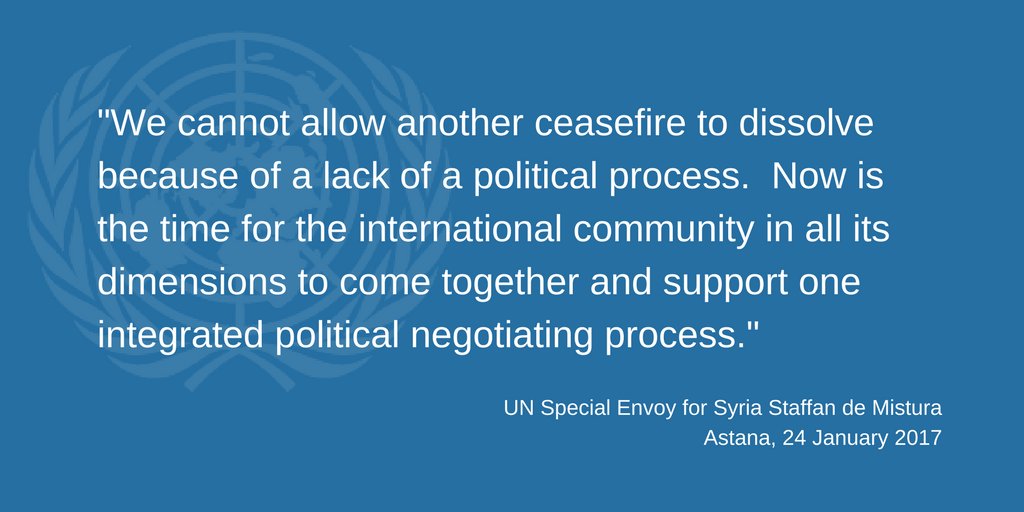‘Dealing with enemies to save Syria’: Astana process paves way for Geneva talks
especiales

Russia, Iran and Turkey have announced they will establish a trilateral mechanism to support the ceasefire in Syria. In a joint statement issued at the end of talks in the Kazakh capital, Astana, they said the Syrian opposition had agreed to take part in peace talks on the issue set for Geneva, Switzerland.
“The delegations of the Islamic Republic of Iran, the Russian Federation and the Republic of Turkey …support launching the talks between the Government of the Syrian Arab Republic and the armed opposition in Astana on January 23-24, 2017,” said a joint statement on Tuesday.
Moscow, Tehran and Ankara “express their conviction that there is no military solution to the Syrian conflict and that it can only be solved though a political process.”
Kazakhstan: Russia, Turkey and Iran create mechanism to observe Syria ceasefire
The sides also agreed to jointly fight terrorists from Islamic State (IS, formerly ISIS/ISIL), which alongside Jabhat Fateh al-Sham (formerly Al-Nusra Front) was not included in the negotiations. The trio suggested separating terrorists from Syrian armed opposition groups, and welcomed the implementation of UN Security Council Resolution 2254 on the Syrian crisis, which was adopted in December 2015.
Russia, Iran and Turkey said that they support the willingness of the armed opposition groups to take part in the next round of talks, which are scheduled for February 8 in Geneva.
‘Extremely painful’ to be in same room as Syrian armed rebels who committed terrorist acts – Damascus rep
Syrian Ambassador to the UN Bashar Jaafari told reporters it was “extremely painful” for the Damascus delegation to sit in the same room as Syrian armed groups “who committed terrorist acts.” He added that it was not the first time they had met, and that the government had to take the step for the sake of the Syrian people.
@SANAEnOfficial Al-Jaafari: #Astana meeting succeed in consolidating cessation of hostilities for a specific period of time http://sana.sy/en/?p=98949
Jaafari said that he viewed the role of Turkey in the Syrian ceasefire as negative, but had to agree to cooperate to facilitate the peace process.
“In politics sometimes we have to deal with enemies to save your country, and this is what we do,” he said.
Jaafari called the negotiations “a success” and expressed support for the joint statement earlier issued by Moscow, Tehran and Ankara.
"Finally we have a consensual paper [the joint statement] agreed upon by everybody," he said.
Answering a reporter’s question, he said that the Syrian government would continue its operation in the Wadi Barada area in the Damascus Countryside Province, as long as the people in the capital remain deprived of water.
Water from the pumping station at Ain al-Fijah in the Wadi Barada area was cut by the Damascus Water Authority in late December, after it said militants had contaminated the source, the Barada River, with diesel fuel. As a result, more than 5 million people have been without water for over two weeks.
Syrian armed opposition supports ceasefire, demands Assad step down
Mohammed Alloush, leader of the Jaysh al-Islam militants, who headed the delegation of the Syrian armed opposition at the Astana talks, said the rebels support a political solution based on UN auspices, while demanding the resignation of Syrian President Bashar Assad.
Alloush added, however, that the Syrian opposition would not engage in any talks with Iran and would not accept any statement by Tehran on Syria’s future. He said that he had given a proposal to Russia on the ceasefire, and expects an answer within a week.
‘Probably first time armed groups sat in the same room with govt since Syria conflict began’ – Mistura on Astana process
Staffan de Mistura, the UN and Arab League Envoy to Syria, told reporters that the UN commends Russia, Iran and Turkey for deciding to establish a mechanism to monitor the ceasefire in Syria.
He underlined the uniqueness of the talks, saying that it was “probably the first time” since the start of the civil war that Syrian armed opposition groups had sat in the same room as the government.
@UN Syrian ppl are desperate for an end to the ongoing brutal & bloody conflict - de Mistura on #AstanaProcess http://bit.ly/2j9ZnBD

“It has required political courage from them to sit in the same room and listen to their respective demands,” he said.
The envoy said he hopes that the political process will continue in Geneva. The only way for peace to come to Syria is through a political solution brought about through intra-Syrian negotiations under the aegis of the UN, he concluded.
“We cannot allow another ceasefire to dissolve because of a lack of a political process. Now is the time for the international community in all its dimensions to come together and support one integrated political negotiating process, as provided for in [UN Security Council Resolution] SCR 2254.”














Add new comment